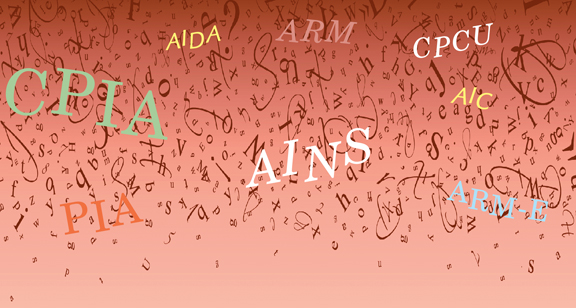Young Professionals
A new series explores designations and the value of earning them
I’m not an “insurance” guy; I’ve mentioned this before. When I first started working for The Rough Notes Company, I got confused when I saw all the acronyms after people’s names—I was literally like, WTH?
Luckily, upon starting the job, I received a copy of Insurance Words & Their Meanings published by The Rough Notes Company, to help clarify what all these acronyms, or designations, referred to; and, no, I didn’t just receive a burlap sack with a dollar sign on it for mentioning the company’s name.
For my next series, I’m going to share with upcoming young talent a handful of the designations available and introduce the organizations that offer them. This series will cover only a fraction of the numerous designations out there, but it will provide the information needed for you or the young professionals at your company to gain knowledge and add an acronym to their names.
The AIMS Society
Founded in 1968 as the Firemark Society, the American Insurance Marketing and Sales (AIMS) Society created the Certified Professional Insurance Agent (CPIA) designation, which “focuses exclusively on insurance sales and marketing skill development,” says Donna Gray, AIMS’s executive director. “Our mission is to inspire passion for insurance marketing and increase sales production among property and casualty insurance agents; AIMS provides training, information and networking services.”
The CPIA is the industry’s only sales-based designation. “It’s offered nationwide and is often sponsored by state Professional Insurance Agents (PIA) chapters, affiliates of the Independent Insurance Agents and Brokers of America (Big “I”) and independent education groups,” says Gray. “The requisite classes are hands-on, how-to workshops that provide the agent actionable, realistic training to apply to real agency situations. Designees have not simply acquired industry knowledge, but also know how to apply that information to help their clients, and they have learned to collaborate and to be accountable.”
“Designees have not simply acquired industry knowledge, but also know how to apply that information to help their clients, and they have learned to collaborate and to be accountable.”
—Donna Gray
Executive Director
The AIMS Society
To attain the CPIA, attendees must complete the three core, one-day Insurance Success Seminars: Position for Success (CPIA 1), Implement for Success (CPIA 2) and Sustain Success (CPIA 3).
“The seminars provide a real-world perspective with an engaging approach, and the emphasis is on participation,” explains Gray. “Topics are up-to-date and relevant, so attendees can return home with practical skills that they can begin implementing from day one.
“At the AIMS Society, we believe preemptive, ongoing insurance education is an agent’s strongest investment. Non-industry-specific sales training is insufficient to meet the unique needs of the insurance industry, and it needs to be combined with broad marketing skills and smart business practices that are tailored to insurance. To that end, we provide training, networking and information services to equip agents to deal with the unique challenges every agency faces.”
The Institutes
The Insurance Institute of America was founded in 1909; the American Institute for Chartered Property Casualty Underwriters in 1942.
“These two organizations formally merged in 2009 under our current brand, The Institutes Risk and Insurance Knowledge Group,” says Elizabeth A. Sprinkel, MS, CPCU, senior vice president of solutions at The Institutes, as it’s more commonly known. “Throughout our history, we have been committed to meeting the evolving professional development needs of the risk management and insurance business. Annually, we serve approximately 100,000 industry professionals; and between 2011 and 2016, we awarded between 11,000 and 16,000 designations per year.”
The organization is also affiliated with The Institutes CPCU Society, the Insurance Research Council, The Institutes Griffith Insurance Education Foundation, RiskBlock™ and MyPath.
“Designation programs give you skills and knowledge that position you for promotions and help you hone your niche.”
—Elizabeth A. Sprinkel, MS, CPCU
Senior Vice President of Solutions
The Institutes
The Institutes offers 25 designation and specialty certificate programs, the most popular being the Chartered Property Casualty Underwriter (CPCUÆ), Associate in General Insurance (AINSÆ), Associate in Claims (AIC™), Associate in Risk Management (ARM™) and Associate in Commercial Underwriting (AU™).
Keeping up with trends, The Institutes has introduced several new designations that cover emerging topics, such as the Associate in Insurance Data Analytics (AIDA™), Cyber Risk Management, and Associate in Risk Management-Enterprise Risk Management (ARM-E™).
“We’re currently exploring many different aspects of how digitization will affect insurance—from data analytics to blockchain to the Internet of Things (IoT),” says Sprinkel.
The CPCU was the first professional designation in the industry, created in 1942 to “formalize education in what was then a fragmented industry,” according to Sprinkel.
“Today it is still the most rigorous designation program in the world, with 90% of course completers saying it improved their careers,” she adds. “We revise and update our courses every year as the industry and best practices evolve. All of our designation and certificate programs are self-guided. Professionals can order textbooks and complete courses online.”
Each program has different require- ments designed to optimize return on investment. Introductory and essentials courses can be completed online, whereas the more rigorous courses require passing multiple exams.
“For instance,” Sprinkel says, “because the CPCU program is ideal for professionals aiming to be leaders in the industry, it is our most demanding, typically taking about two to three years to complete. Meanwhile, our AINS program, which is ideal for early to mid-career professionals aiming to solidify their skills to advance or for individuals who don’t work directly in insurance roles but are connected to the industry, takes about nine to 15 months to complete.”
The CPCU designation’s courses include Insurance Operations, Business Law for Insurance Professionals, Financial Planning, and Survey of Commercial Insurance, just to name a few.
The National Alliance
With its mission statement to “be the indispensable, transformative learning resource for risk and insurance professionals through technology and practical instruction,” The National Alliance for Insurance Education & Research has done so for almost five decades.
“Over 150,000 professionals across the United States and worldwide have used and continued to use our programs as the foundation upon which they build their successful careers and businesses,” says William J. Hold, CRM, CISR, senior vice president of business development for The National Alliance. “The educational programs and research conducted by The National Alliance were built on a foundation of integrity, innovation, and imagination. These qualities commit us to act responsibly, to be accountable for our actions, to fulfill our obligations, and to inspire others with our determination to achieve a standard of excellence.”
The National Alliance offers the following designations: Certified Insurance Counselor (CIC), Certified Insurance Service Representative (CISR), Certified Risk Manager (CRM), Certified Personal Risk Manager (CPRM), and Certified School Risk Manager (CSRM); we’re going to focus on the first three.
“Clients, colleagues, and agency and company owners and managers acknowledge the income-growing success and excellence that the achievement of a designation brings.”
—Will J. Hold, CRM, CISR
Senior Vice President of Business Development
The National Alliance
As the flagship designation, the CIC program was created in 1969. “The CIC has a property/casualty focus, and also provides insurance education in other key areas,” says Hold. “One can earn the designation by taking five CIC courses of choice—or four CIC courses and one CRM or CPRM course—and passing all five exams within five years of completion of the first CIC exam. CIC and CRM courses are available in a traditional classroom or instructor-led online; CPRM is offered in the classroom only.”
The seven courses offered in this program are: Personal Lines, Commercial Casualty, Commercial Property, Life & Health, Agency Management, and two new courses—Commercial Multiline and Insurance Company Operations.
With a similar timeframe and five-course requirement, the CRM program has provided risk management education for over two decades.
According to Hold, the designation “demonstrates that its holder is knowledgeable in all areas of managing risks, hazards, and exposures. The five CRM courses provide in-depth knowledge about today’s highest priorities—identifying, analyzing, controlling, financing, and administering operational risks—as well as political risks, catastrophic loss exposures, third-party exposures, fiduciary exposures, employee injury exposures, juridical risks, and legal risks.”
The five courses offered in this program are: Principles of Risk Management, Analysis of Risk, Control of Risk (recently revised and updated), Financing of Risk, and Practice of Risk Management.
For over three decades, the CISR designation has offered an ever-expanding selection of practical, skill-building opportunities for agency and company service professionals.
“Geared to building the careers of service representatives, agents, and other key agency personnel, the wide variety of courses provide valuable career-building expertise,” says Hold. “Agencies and companies actively support their employees in the pursuit of this designation.”
The nine courses offered in the program are: Commercial Casualty I—CGL, Additional Insureds; Commercial Casualty II—BAP, WC, Excess Liability; Insuring Commercial Property; Insuring Personal Residential Property; Insuring Personal Auto Exposures; Personal Lines—Miscellaneous; Agency Operations; Life & Health Essentials; and Elements of Risk Management.
The CISR’s five exams must be completed within three calendar years after passing the first exam. Taking and passing all nine courses achieves CISR Elite status. Courses are available in a traditional classroom setting, but unlike the instructor-led online courses in the other two designations, the CISR sessions online are self-paced.
Are designations for you?
You may be intrigued but might still be pondering whether earning a designation is worth the time, effort and money. Yes, like most educational opportunities, designation classes cost money; however, your employer may cover all or part of the cost. The simple answer to your pondering is yes, you should.
“Early in your career, introductory courses can quickly earn you respect and give you the foundational knowledge to succeed; they ensure you’re meeting your company’s and clients’ needs effectively and efficiently,” says Sprinkel.
“Further in your career, more comprehensive designations can demonstrate your commitment to your field. Designation programs give you skills and knowledge that position you for promotions and help you hone your niche. Advanced designations help earn you respect as a leader, diversify your skill set and ensure you’re always staying ahead of your competition.”
Gray agrees. “Investing in your professional education demonstrates your commitment to serving clients,” she says. “It shows that you care not only about your ethical and practical insurance knowledge, but also about your promise to customers who put their trust in you.
“To succeed while selling a product that is interchangeable with what your competitors offer, you must stand out as a leader who goes the extra step for clients. It is the trifecta of forward-thinking sales methods, customer-centric value-added services, and a demonstrated commitment to your professional education that will make you irreplaceable to your clients.”
“The National Alliance is focused on providing learning paths for new insurance professionals, and designations are a vital part of that path,” says Hold. “It makes sense to pursue a designation that will elevate your career and increase your insurance and risk management knowledge. Clients, colleagues, and agency and company owners and managers acknowledge the income-growing success and excellence that the achievement of a designation brings.”
In our next handful of installments, we’ll hear directly from professionals who have earned the designations introduced above, their educational process experience and how their acronymic achievements have helped their careers. Until next time.
By Christopher W. Cook
For more information:
The AIMS Society
www.aimssociety.org
The Institutes
www.theinstitutes.org
The National Alliance for Insurance Education and Research
www.scic.com






